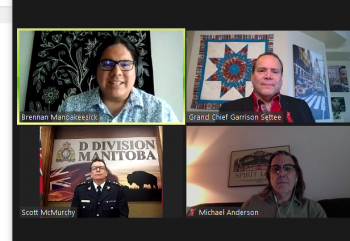Summary
Local Journalism Initiative Reporter
Windspeaker.com
A new protocol agreement announced today between the Manitoba Keewatinowi Okimakanak (MKO), the RCMP and the Public Prosecution Services of Canada (PPSC) will lead to the enforcement and prosecution of specific Indian Act bylaws enacted by First Nations in northern Manitoba to protect their communities from the coronavirus.
“First Nations are particularly vulnerable to COVID-19 due to an unequal access to adequate housing, health care, clean water and food. These problems are compounded when the laws intended to protect the communities are not recognized, respected, enforced and prosecuted,” said MKO Grand Chief Garrison Settee.
Concerns were raised by First Nations across the country that bylaws they enacted for curfews, to set up roadblocks, restrict access to their communities, to quarantine, to prevent people from moving in to sell drugs or alcohol, and to prohibit gatherings, among other measures, were not being enforced by the RCMP, which provides policing for the majority of reserves.
This new protocol, when signed by any of the 26 member nations of MKO, means that bylaws adopted by the individual First Nation pursuant to Sect. 81 and Sect. 85.1 of the Indian Act in response to the COVID-19 pandemic, are enforceable by the Manitoba RCMP.
Section 81 deals with matters that are local to the reserve, such as traffic control and residency, public health and nuisances, while Sect. 85.1 deals with intoxicants and intoxication on the reserve.
Superintendent Scott McMurchy, deputy criminal operations officer with Manitoba RCMP, said the protocol now gave the RCMP the tools they needed.
“There was a gap, however, in enforcing local bylaws enacted by chiefs and councils that were aimed to curtail the spread of the virus in our First Nations communities. In essence there was a missing mechanism to investigate and charge those who did not respect the newly enacted Indian Act bylaws. We recognized … that all police agencies, including the RCMP, have an important role to play in the enforcement of Indigenous laws,” said McMurchy.
McMurchy said the discussions between the three partners took “months and months.”
For those MKO nations who do not have COVID-19 specific frameworks in place, Michael Anderson, MKO policing and public safety advisor, said MKO has been working with the Manitoba Public Interest Law Centre to create a framework bylaw that could be used by the community to build a bylaw specific to meet its needs.
“We’ve prepared ourselves by doing our work to be ready to assist our First Nations in implementing the protocol if they so choose,” said Anderson.
The protocol becomes operational when signed by a specific MKO nation and representatives from the RCMP and PPSC.
The agreement states that the PPSC will “conduct the prosecution of by-law offences committed in relation to the COVID-19 pandemic and which took place after March 20, 2020 until September 30, 2021 unless the parties agree to renew the agreement.”
However, discretion to prosecute lies with the PPSC which will decide “whether to conduct a prosecution, to stay it, or to withdraw the charges.”
The protocol is not legally binding or “enforceable before the courts.”
Earlier in the day, both Settee and Anderson appeared before the House of Commons standing committee on Indigenous and Northern Affairs.
Settee told the committee that although the protocol agreement was specific to COVID-19, it should not be restricted by COVID-19 needs.
“The protocol for enforcing and prosecuting any of the Indian Act bylaws should be applied generally and extend beyond the COVID-19 pandemic. The pandemic clearly shows the gaps and barriers in recognizing, respecting and enforcing and prosecution of First Nations laws and bylaws and the urgent need to uphold the rule of law,” said Settee.

